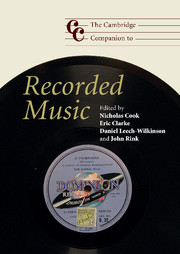Book contents
- Frontmatter
- Introduction
- Learning to live with recording
- A short take in praise of long takes
- 1 Performing for (and against) the microphone
- Producing a credible vocal
- ‘It could have happened’: The evolution of music construction
- 2 Recording practices and the role of the producer
- Still small voices
- Broadening horizons: ‘Performance’ in the studio
- 3 Getting sounds: The art of sound engineering
- Limitations and creativity in recording and performance
- Records and recordings in post-punk England, 1978–80
- 4 The politics of the recording studio: A case study from South Africa
- From Lanza to Lassus
- 5 From wind-up to iPod: Techno-cultures of listening
- A matter of circumstance: On experiencing recordings
- 6 Selling sounds: Recordings and the record business
- Revisiting concert life in the mid-century: The survival of acetate discs
- 7 The development of recording technologies
- Raiders of the lost archive
- The original cast recording of West Side Story
- 8 The recorded document: Interpretation and discography
- One man's approach to remastering
- Technology, the studio, music
- Reminder: A recording is not a performance
- 9 Methods for analysing recordings
- 10 Recordings and histories of performance style
- Recreating history: A clarinettist's retrospective
- 11 Going critical: Writing about recordings
- Something in the air
- Afterword: Recording: From reproduction to representation to remediation
- Notes
- Bibliography
- Discography
- Index
Reminder: A recording is not a performance
Published online by Cambridge University Press: 28 September 2011
- Frontmatter
- Introduction
- Learning to live with recording
- A short take in praise of long takes
- 1 Performing for (and against) the microphone
- Producing a credible vocal
- ‘It could have happened’: The evolution of music construction
- 2 Recording practices and the role of the producer
- Still small voices
- Broadening horizons: ‘Performance’ in the studio
- 3 Getting sounds: The art of sound engineering
- Limitations and creativity in recording and performance
- Records and recordings in post-punk England, 1978–80
- 4 The politics of the recording studio: A case study from South Africa
- From Lanza to Lassus
- 5 From wind-up to iPod: Techno-cultures of listening
- A matter of circumstance: On experiencing recordings
- 6 Selling sounds: Recordings and the record business
- Revisiting concert life in the mid-century: The survival of acetate discs
- 7 The development of recording technologies
- Raiders of the lost archive
- The original cast recording of West Side Story
- 8 The recorded document: Interpretation and discography
- One man's approach to remastering
- Technology, the studio, music
- Reminder: A recording is not a performance
- 9 Methods for analysing recordings
- 10 Recordings and histories of performance style
- Recreating history: A clarinettist's retrospective
- 11 Going critical: Writing about recordings
- Something in the air
- Afterword: Recording: From reproduction to representation to remediation
- Notes
- Bibliography
- Discography
- Index
Summary
Today's CD buyer/internet downloader demands, and mostly gets, a ‘perfect’ soundworld: sonic sumptuousness is as important as compositional content, and the performer's prowess goes without saying. If, in so-and-so's new Chopin recording, the piano is too distant, or too tinny, or in an acoustic so reverberant as to blur detail and condense the dynamic range, then it will simply collect dust on the shelf. Recordings with performer errors are similarly undesirable. I am, however, fond of Mary Garden's 1904 recording of Debussy's ‘L'ombre des arbres’ from Ariettes oubliées with Debussy at the piano – an important document of course, but also memorable because after the opening piano introduction Garden enters on the wrong note. This is swiftly corrected by Debussy, who also (just in case) gives her the starting note for the second-verse entry. It always raises a smile. Wrong notes, untidy ensemble or imperfect intonation in live performance are, to some extent, the fragile nature of the business, and Garden's recording is a performance preserved for posterity. Yes, audiences are impressed by impeccably virtuosic playing (a spectator sport akin to gawping at a freak show), but we performers are also curiously and necessarily fallible: attempting, say, the extraordinarily slow speeds Messiaen asks for in the solo movements of Quatuor pour la fin du temps, or a real tutta forza fffff in works by Birtwistle or Maxwell Davies, is certainly technically challenging, and these kinds of dangerous moments in performance, even when they don't quite work, are exhilarating for performer and audience alike.
- Type
- Chapter
- Information
- The Cambridge Companion to Recorded Music , pp. 217 - 220Publisher: Cambridge University PressPrint publication year: 2009
- 1
- Cited by



